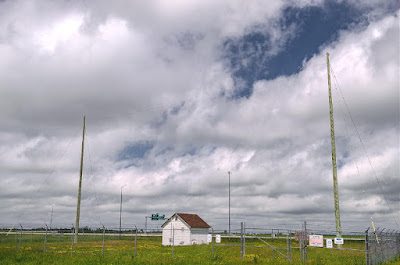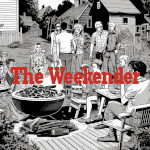 Hunting For NDBs In CLE 274
Hunting For NDBs In CLE 274
 |
| ZWG - 287kHz Winnipeg courtesy: http://www.ve3gop.com/ |
I know it's hard to believe but it's CLE time once again. How quickly time zooms by.
When tuning for NDBs, put your receiver in the CW mode and listen for the NDB's CW identifier, repeated every few seconds. Listen for U.S. NDB identifiers approximately 1 kHz higher or lower than the published transmitted frequency since these beacons are modulated with a 1020 Hz tone approximately.
For example, 'AA' near Fargo, ND, transmitted on 365 kHz and its upper sideband CW identifier was tuned at 366.025 kHz while its lower sideband CW ident could be tuned at 363.946 kHz. Its USB tone was actually 1025 Hz while its LSB tone was 1054 Hz.
Often, one sideband will be much stronger than the other so if you don't hear the first one, try listening on the other sideband.
Canadian NDBs normally have an USB tone only, usually very close to 400 Hz. They also have a long dash (keydown) following the CW identifier.
All NDBs heard in North America will be listed in the RNA database (updated daily) while those heard in Europe may be found in the REU database. Beacons heard outside of these regions will be found in the RWW database. These databases have recently been re-vamped and are slicker than ever before!
From CLE organizers comes the following CLE info:
Hello all
Here are brief details for our 274th co-ordinated listening event next weekend.
It spans a 50 kHz frequency range - about three times wider than usual.
In that range, the Rxx database is showing about 200 active NDBs located in Europe, 120 in North America, 35 in Oceania. The numbers are approximately doubled if you include DX from other parts of the World that have been heard from each of those three regions.
Days: Friday 26 November – Monday 29 November
Times: Start and end at midday, your LOCAL time
Range: 270.0 - 319.9 kHz (NDB signals only)
Part of the frequency range also has DGPS signals among the NDBs.
We last listened on these frequencies in CLE259 in August 2020.
Any first-time CLE logs will be very welcome, as always.
Send your final log to the List (not in an attachment, please) with 'CLE274’ and ‘FINAL' in its title (important).
Show on each line:
# The Date (e.g. '2021-11-26', etc., or just '26' )
# The Time in UTC (the day changes at 00:00 UTC).
# kHz - the nominal published frequency, if known.
# The Call Ident.
Please show those main items FIRST. Other optional details such as Location and Distance go LATER in the same line.
As always, of course, tell us your own location and give brief details of the equipment that you were using during the Event.
We will send the usual 'Any More Logs?' email at about 19:00 UTC on Tuesday so you can check that your log has been found OK.
Do make sure that your log has arrived on the List by 08:00 UTC on Wednesday 01 December at the very latest.
We hope to complete making the combined results within a day or two.
You can soon find full details about current and past CLEs from the CLE page http://www.ndblist.info/cle.htm It includes access to the CLE274 seeklists for your part of the World, prepared from all the previous loggings in Rxx.
Good listening
- enjoy the CLE.
Brian and Joachim
------------------------------------------------------------------
From: Brian Keyte G3SIA ndbcle'at'gmail.com
Location: Surrey, SE England (CLE coordinator)
------------------------------------------------------------------
(If you would like to listen remotely you could use any one remote receiver for your loggings, stating its location and owner and with their permission if required. A remote listener may NOT also use
another receiver, local or remote, to make further loggings for the same CLE)
These listening events serve several purposes. They
• determine, worldwide, which beacons are out-of-service or have gone silent since the last CLE covering this range
• will indicate the state of propagation conditions at the various participant locations
• will give you an indication of how well your LF/MF receiving system is working
• give participants a fun yet challenging activity to keep their listening skills honed
Final details can be found at the NDB List website, and worldwide results, for every participant, will be posted there a few days after the event.
The NDB List Group is a great place to learn more about the 'Art of NDB DXing' or to meet other DXers in your region. There is a lot of good information available there and new members are always very welcome. As well, you can follow the results of other CLE participants from night to night as propagation is always an active topic of discussion.
You need not be an NDB List member to participate in the CLEs and all reports, no matter how small, are of much value to the organizers.
Remember - 'First-time' logs are always VERY welcome!
Reports may be sent to the NDB List Group or e-mailed to CLE co-ordinator, Brian Keyte (G3SIA), whose address appears above. If you are a member of the group, all final results will also be e-mailed and posted there.
Please ... give the CLE a try ... then let us know what NDB's can be heard from your location! Your report can then be added to the worldwide database to help keep it up-to-date.
Have fun and good hunting!
Steve McDonald, VE7SL, is a regular contributor to AmateurRadio.com and writes from British Columbia, Canada. Contact him at [email protected].
 LHS Episode #442: Database Essentials Deep Dive
LHS Episode #442: Database Essentials Deep Dive
Hello and welcome to the 442nd installment of Linux in the Ham Shack. In this episode, the hosts discuss databases of various types, especially those used in amateur radio related applications. Topics include styles of databases, storage formats, structured and unstructured data, client and server architectures, management utilities and data manipulation techniques. We hope you enjoy this episode and find the information useful. Thanks for listening and have a great week.
73 de The LHS Crew
Russ Woodman, K5TUX, co-hosts the Linux in the Ham Shack podcast which is available for download in both MP3 and OGG audio format. Contact him at [email protected].
 ICQ Podcast Episode 364 – Tackling RFI and IRU Conference Feedback
ICQ Podcast Episode 364 – Tackling RFI and IRU Conference Feedback
In this episode, Martin Butler (M1MRB) is joined by Chris Howard (M0TCH), Martin Rothwell (M0SGL), Frank Howell (K4FMH) and Bill Barnes (WC3B) to discuss the latest Amateur / Ham Radio news. Colin (M6BOY) rounds up the news in brief and in the episode's feature we catch up with the RSGB, covering topics including Tackling RFI, IRU Region 1 Conference, training and a second year of virtual conferencing.
We would like to thank Winston Lawrence (KD2WLL), Theodore Langdon (KU9CPD) and our monthly and annual subscription donors for keeping the podcast advert free. To donate, please visit - http://www.icqpodcast.com/donate
- Volunteers Needed to Investigate Interference Problems
- October 2021 Volunteer Monitor Program Report
- Calling All Payphone Users - Thousands of Call Boxes Set for Protection
- Alike, but Not Alike: Broadcast vs Ham Radio
- Ireland and India Join Parks on the Air
- The CWops Award for Advancing the Art of CW
- Digital Radio Operating Manual
- Hamzilla Radio Rally On!!!
Colin Butler, M6BOY, is the host of the ICQ Podcast, a weekly radio show about Amateur Radio. Contact him at [email protected].
 LHS Episode #441: Holy Distractions, Batman!
LHS Episode #441: Holy Distractions, Batman!
Hello and welcome to Episode #441 of Linux in the Ham Shack. In this short-topics episode, the hosts discuss several stories including the latest ARDC grants for ham radio projects, the latest ARRL Handbook, mapping a supernova with SDRs, Lua and Luau, Pipewire, mod_hamradio and much more. Thanks for listening and have a fantastic week.
73 de The LHS Crew
Russ Woodman, K5TUX, co-hosts the Linux in the Ham Shack podcast which is available for download in both MP3 and OGG audio format. Contact him at [email protected].
 LHS Episode #440: The Weekender LXXXII
LHS Episode #440: The Weekender LXXXII
It's time once again for The Weekender. This is our bi-weekly departure into the world of amateur radio contests, open source conventions, special events, listener challenges, hedonism and just plain fun. Thanks for listening and, if you happen to get a chance, feel free to call us or e-mail and send us some feedback. Tell us how we're doing. We'd love to hear from you.
73 de The LHS Crew
Russ Woodman, K5TUX, co-hosts the Linux in the Ham Shack podcast which is available for download in both MP3 and OGG audio format. Contact him at [email protected].
 AmateurLogic 162: SDRPlay HD Radio, Android Pi, LiFePO4 Battery
AmateurLogic 162: SDRPlay HD Radio, Android Pi, LiFePO4 Battery
AmateurLogic.TV Episode 162 is now available for download.
George explains AM & FM Broadcast Signals and decodes HD Radio on an SDRPlay receiver. Mike cooks up some tasty Android Pi. Is this the Pi OS we’ve been waiting for? Tommy builds an economical 50 Ah LiFePO4 Battery Pack.
George Thomas, W5JDX, is co-host of AmateurLogic.TV, an original amateur radio video program hosted by George Thomas (W5JDX), Tommy Martin (N5ZNO), Peter Berrett (VK3PB), and Emile Diodene (KE5QKR). Contact him at [email protected].
 LHS Episode #439: OLF 2021 Deep Dive
LHS Episode #439: OLF 2021 Deep Dive
In this deep dive episode of Linux in the Ham Shack, we talk to Beth Lynn Eicher from the upcoming Ohio Linux Fest. We go over a bit of the history of OLF and then Beth Lynn gives our listeners the low down on everything that's going to happen at this year's event. The pandemic has made in-person conferences difficult but this time around it sounds like it's going to be a lot of fun with both a local and virtual presence. So if you're going to be around Columbus, Ohio on December 3-4 or you have some free time to visit online, make sure to come by the show.
73 de The LHS Guys
Russ Woodman, K5TUX, co-hosts the Linux in the Ham Shack podcast which is available for download in both MP3 and OGG audio format. Contact him at [email protected].

















